
In response to Khashoggi disappearance, U.S.-Saudi relations strained
By: Connor McNairn, Columnist
Jamal Khashoggi, a Saudi journalist who writes a column for the Washington Post, disappeared on the afternoon of Oct. 2. Khashoggi’s disappearance made international headlines when, while attempting to secure paperwork necessary to marry his Turkish fiancé, the journalist went missing inside of the Saudi consulate in Istanbul, Turkey.
As the story gained international traction throughout this past week, differing explanations presented by both the Turkish and Saudi governments heightened its degree of mystery. According to the Turkish version, Khashoggi was intentionally lured to the consulate, kidnapped, murdered and even potentially dismembered by Saudi operatives. In striking contrast, Riyadh claims that the event was fabricated by its political enemies, including the Muslim Brotherhood, Qatar and Turkey itself.
Khashoggi’s disappearance comes at a time when liberal institutions, namely those driven by the press in an effort to maintain governmental transparency, have fallen under attack. Press freedoms, which are absolutely crucial in maintaining governmental legitimacy and ensuring accountability, have been threatened globally by increasingly authoritarian leaders, not the least of which include Egypt’s Abdel Fatah al-Sisi, China’s Xi Jinping and even Turkey’s Recep Tayyip Erdogan.
But in Khashoggi’s case, the international community seems to have shed an increasingly bright light on Mohammed bin Salman’s (MBS) treatment of the media as well as human rights efforts more broadly. MBS has found himself in hot international waters in past, ranging from his spat with Canadian Prime Minister Justin Trudeau, which stemmed from the detention of a women’s rights activist, to his locking up of Saudi businessmen which deeply harmed Riyadh’s global business prospects.
It is, therefore, no stretch of the imagination to contemplate bin Salman’s potential order to dispose of an internationally respected Washington Post columnist who was notoriously critical of Saudi leadership.
When events like these rock the global community, devising responsible yet effective diplomatic responses becomes increasingly vital for key international actors; the United States is no exception.
Thus far, President Trump has remained fairly measured regarding Khashoggi’s disappearance. In a recent “60 Minutes” interview conducted by CBS’s Lesley Stahl, President Donald Trump vowed that “severe punishment” would befall the Saudi government if it was, in fact, found responsible for Khashoggi’s potential death. And, naturally, in response to President Trump’s declaration, the Saudi Kingdom both denied responsibility for Khashoggi’s disappearance and affirmed that if the U.S. should pursue any policy harmful to Riyadh, it would not shy away from escalating tensions in the form of economic separation.
At the center of this conundrum exists a key economic relationship (revolving around oil) for both the U.S. and Saudi Arabia. What is more, the U.S. has also been active abroad in aiding Saudi military ventures, namely in the current Yemeni Civil War.
The United States, then, is currently faced with a predicament that both fundamentally questions its loyalty to domestic freedom yet potentially compromises its economic interests abroad. The U.S. Congress, through bipartisan declaration, has already called for a potential reduction in both economic and diplomatic dealings with the kingdom following Khashoggi’s disappearance.
Within the coming weeks, major decisions made by Congress through punitive measures or the president via diplomacy, may shift the foundations of U.S.-Saudi relations and alter the projection of American influence in the greater Middle East.

